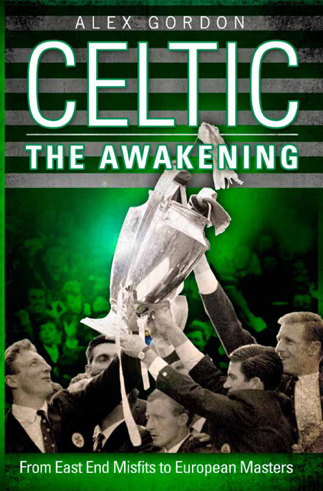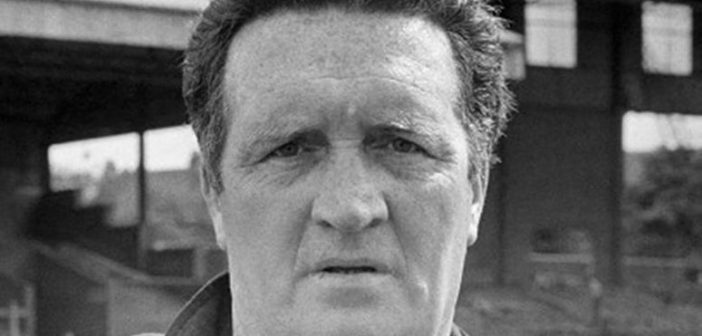CELTIC’S hunt for Neil Lennon’s successor has proved to be a frustrating one for the Hoops support.
The quest for a new manager once again emphasised patience is a virtue when dealing with such delicate and crucially important decisions.
In another CQN EXCLUSIVE series, we turn the clock back on other vital appointments in the history of the club.
Here is an extract from author Alex Gordon’s book, ‘Celtic: The Awakening’, which looks at the arrival of the legendary Jock Stein in 1965.

RONNIE SIMPSON, whose father Jimmy was a former Rangers player, made his Old Firm debut on 1 January 1965. New goalkeeper, same old outcome with Jim Forrest claiming the only goal of a fairly drab contest which wasn’t helped by the dodgy pitch. Studs crunched on the carpet of frost as conditions deteriorated while the game wore on.
The Ibrox playing surface gleamed under the floodlights and even managed to look very picturesque. A winter wonderland for Celtic fans it was not. Once again, they had little to enthuse over following a derby reverse at the turn of the year.
Nevertheless, the support would be more than a little intrigued by what the club did next two weeks into the new year. Celtic brought back Bertie Auld, sold to Birmingham City for £15,000 in April 1961. They paid £12,000 for a player, who, like his good friend Paddy Crerand, was never slow to voice an opinion in the dressing room. It was an unusual step for the club, but who was behind the transfer?
It was unlikely to have been chairman Bob Kelly, who must have had a major say in Auld, against his wishes, leaving in the first place. Was it Jimmy McGrory, the manager being given his place, albeit belatedly? Was it Sean Fallon, who took more to do with the coaching and running of the first team than anyone else? Or was there the possibility of Jock Stein, still manager of Hibs, laying down some ground work before returning to Celtic?
Bertie Auld attempts to shed some light on the topic. ‘I was at home when I received a telephone call from a guy called Dougie Hepburn who just happened to be a big pal of Jock Stein. He asked, “Would you like to come back to Celtic?” I didn’t hesitate, “When? Tonight?” I said. I have to admit I think it was Big Jock who was behind the signing.
‘I recall bumping into Big Jock when he was down in Birmingham to take in an English League v. Scottish League game around about that time. He was accompanied by Bob Kelly. The Hibs manager with the Celtic chairman? I’ll let you draw your own conclusions.
‘Anyway, Big Jock was quite chatty and said, “How are things going, Bertie? Enjoying yourself?” I answered, “I’m having a great time. I’ve just become a father, too. Everything is wonderful.” Big Jock rarely, if ever, indulged in small talk, but, on this occasion, he seemed genuinely interested in what was going on in my life, on and off the pitch.
‘Anyway, history now shows I returned to the club I never wanted to leave in the first place in January 1965. I even agreed to take a £5 drop in my wages, a lot of money at the time. I’m convinced my wife Liz must have thought I was going off my head. So, I came back to my spiritual home and Big Jock was to join up formally at Celtic two months later. It could have been a coincidence, but I certainly was not complaining. I sensed some fabulous things were about to happen.’
Auld made his second Celtic debut eight years after the first when he faced Hearts on 16 January at Parkhead. Tommy Gemmell welcomed back a player who would become a lifelong friend with a scorching goal, but the Edinburgh side still won 2-1. A week later Gemmell, with a shot of resistance-wrecking power, scored again in a 3-3 draw with Morton. Auld had to wait for his first victory – and first goal – with only a day of January remaining.
It was a memorable occasion with Celtic hammering Aberdeen 8-0 in Glasgow with John Hughes shredding the Dons rearguard and scoring five. Lennox and Murdoch knocked in the others and Auld, designated as the new penalty-taker, showed his prowess by striking one perfectly beyond John ‘Tubby’ Ogston.
Twenty-four hours later came the announcement that dramatically changed the fortunes of Celtic Football Club – Jock Stein was to become the new manager. He agreed to succeed Jimmy McGrory, but only after Hibs found a new manager themselves. Bob Shankly, brother of Liverpool legend Bill, got the Easter Road position after leaving Dundee and Stein was officially named the new Celtic boss on March 9.
However, the jungle drums had been beating long before the news broke. It’s not easy to keep secrets in football and Glasgow, it must be said, is a wonderful city of rumour. Stein, a well-known punter, played his cards extremely close to his chest. He had, after all, only become the Hibs manager in April 1964. However, the pull of Celtic was to prove irresistible.
Stein was originally asked to become joint manager with Sean Fallon. Stein never intended any disrespect towards the Irishman, a former team-mate, but clearly it was going to be his way or no way. Fallon had taken over the duties as manager during the reign of McGrory and it had been widely acknowledged within the walls of Parkhead that one day the job would be his.
Stein, though, stuck to his guns. News was somehow leaked that Wolves, searching for a new manager, were casting a gaze in Stein’s direction. Kelly, as everyone realised, liked to get things his own way. Stein was prepared for a game of bluff and double bluff. He won in the end, as he knew he would.
Stein met his new players only twenty-four hours before a league match against Airdrie at Broomfield on March 10, but it was obvious the main target for Celtic was the Scottish Cup after reaching the semi-final following a real humdinger of a quarter-final tie in the mud of Parkhead four days beforehand. Celtic overcame Kilmarnock 3-2 and suddenly there was a belief about the place, heightened with the imminent arrival of Stein.
The new boss had a brief message for his players, ‘You work hard for this club and I will work hard for this club. Together we will achieve something.’
Auld said, ‘It was as brief as that. I knew Jock, of course, and many of the Celtic players had been in the reserves when he was coaching the second string. For a couple, though, it would have been the first meeting with Jock that morning. I’m sure they didn’t know what to expect. Jock kept it simple.’
In Stein’s first game in charge against Airdrie at Broomfield, Auld slammed in five goals, two penalty-kicks among them, in a 6-0 victory. Auld laughed, ‘I always thought I had good timing.’
On April 24, 1965, fans’ favourite Bertie underlined that fact by scoring twice in the 3-2 Scottish Cup Final triumph over Dunfermline as Celtic won their first piece of silverware in eight years.
Big Jock Stein had already put down a marker as Celtic manager.

